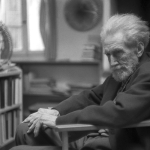1920 (Mauberley)
I
Turned from the“eau-forte
Par Jaquemart”
To the strait head
Of Messalina:
“His True Penelope
Was Flaubert,”
And his tool
The engraver's.
Firmness,
Not the full smile,
His art, but an art
In profile;
Colourless
Pier Francesca,
Pisanello lacking the skill
To forge Achaia.
II
“Qu’est ce qu’ils savent de l’amour, et qu’est ce qu’ils peuvent comprendre?
S’ils ne comprennent pas la poésie, s’ils ne sentent pas la musique, qu’est ce qu’ils peuvent comprendre de cette passion en comparaison avec laquelle la rose est grossière et le parfum desviolettes un tonnerre?” — CAID ALI
For three years, diabolus in the scale,
He drank ambrosia,
All passes, ANANGKE prevails,
Came end, at last, to that Arcadia.
He had moved amid her phantasmagoria,
Amid her galaxies,
NUKTIS’AGALMA
. . . . . . . .
Drifted ... drifted precipitate
Asking time to be rid of ...
Of his bewilderment; to designate
His new found orchid. ...
To be certain ... certain ...
(Amid ærial flowers) ... time for arrangements—
Drifted on
To the final estrangement;
Unable in the supervening blankness
To sift TO AGATHON from the chaff
Until he found his sieve ...
Ultimately, his seismograph:
—Given that is his “fundamental passion,”
This urge to convey the relation
Of eye-lid and cheek-bone
By verbal manifestations;
To present the series
Of curious heads in medallion—
He had passed, inconscient, full gaze,
The wide-banded irides
And botticellian sprays implied
In their diastasis;
Which anæsthesis, noted a year late,
And weighed, revealed his great affect,
(Orchid), mandate
Of Eros, a retrospect.
. . .
Mouths biting empty air,
The still stone dogs,
Caught in metamorphosis, were
Left him as epilogues.
“THE AGE DEMANDED”
VIDE poem II. PAGE 355
For this agility chance found
Him of all men, unfit
As the red-beaked steeds of
The Cytheræan for a chain bit.
The glow of porcelain
Brought no reforming sense
To his perception
Of the social inconsequence.
Thus, if her colour
Came against his gaze,
Tempered as if
It were through a perfect glaze
He made no immediate application
Of this to relation of the state
To the individual, the month was more temperate
Because this beauty had been.
. . . . .
The coral isle, the lion-coloured sand
Burst in upon the porcelain revery:
Impetuous troubling
Of his imagery.
. . . . .
Mildness, amid the neo-Nietzschean clatter,
His sense of graduations,
Quite out of place amid
Resistance to current exacerbations,
Invitation, mere invitation to perceptivity
Gradually led him to the isolation
Which these presents place
Under a more tolerant, perhaps, examination.
By constant elimination
The manifest universe
Yielded an armour
Against utter consternation,
A Minoan undulation,
Seen, we admit, amid ambrosial circumstances
Strengthened him against
The discouraging doctrine of chances,
And his desire for survival,
Faint in the most strenuous moods,
Became an Olympian apathein
In the presence of selected perceptions.
A pale gold, in the aforesaid pattern,
The unexpected palms
Destroying, certainly, the artist’s urge,
Left him delighted with the imaginary
Audition of the phantasmal sea-surge,
Incapable of the least utterance or composition,
Emendation, conservation of the “better tradition,”
Refinement of medium, elimination of superfluities,
August attraction or concentration.
Nothing, in brief, but maudlin confession,
Irresponse to human aggression,
Amid the precipitation, down-float
Of insubstantial manna,
Lifting the faint susurrus
Of his subjective hosannah.
Ultimate affronts to human redundancies;
Non-esteem of self-styled “his betters”
Leading, as he well knew,
To his final
Exclusion from the world of letters.
IV
Scattered Moluccas
Not knowing, day to day,
The first day’s end, in the next noon;
The placid water
Unbroken by the Simoon;
Thick foliage
Placid beneath warm suns,
Tawn fore-shores
Washed in the cobalt of oblivions;
Or through dawn-mist
The grey and rose
Of the juridical
Flamingoes;
A consciousness disjunct,
Being but this overblotted
Series
Of intermittences;
Coracle of Pacific voyages,
The unforecasted beach;
Then on an oar
Read this:
“I was
And I no more exist;
“Here drifted
An hedonist.”
MEDALLION
Luini in porcelain!
The grand piano
Utters a profane
Protest with her clear soprano.
The sleek head emerges
From the gold-yellow frock
As Anadyomene in the opening
Pages of Reinach.
Honey-red, closing the face-oval,
A basket-work of braids which seem as if they were
Spun in King Minos’ hall
From metal, or intractable amber;
The face-oval beneath the glaze,
Bright in its suave bounding-line, as,
Beneath half-watt rays,
The eyes turn topaz.


















Comment form: